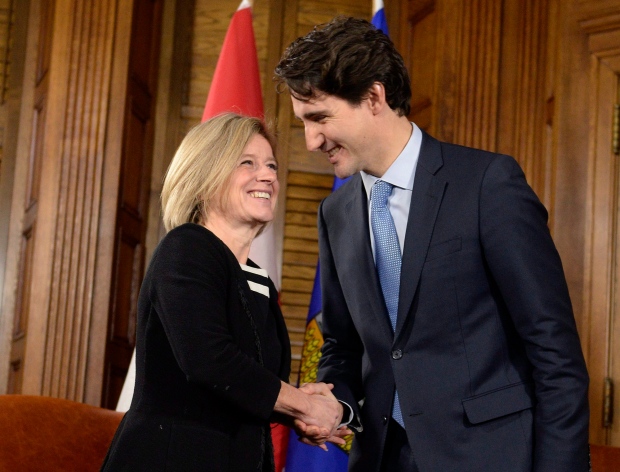Karl Nerenberg is your reporter on the Hill. Please consider supporting his work with a monthly donation. Support Karl on Patreon today for as little as $1 per month!
Late Tuesday afternoon, Prime Minister Trudeau and his government gave the green light to a pipeline that would carry heavy-oil through the most densely populated part of Western Canada.
The Trans Mountain pipeline, a project of U.S. company Kinder Morgan, would allow tar sands oil producers to ship their product to China and other Asian countries. It would end the companies’ exclusive dependence on the U.S. market.
Federal NDP leader Tom Mulcair reacted to the decision with vitriol.
He said the legions of British Columbians who voted Liberal in 2015 did not expect, nor deserve, this.
Trudeau, Mulcair said, had promised those voters a new, robust approval process for pipelines. Instead, said the federal NDP leader, the Liberal government approved the Kinder Morgan project on the basis of former Conservative Prime Minister Stephen Harper’s flawed and inadequate process.
Mind you, the federal NDP does not say it would never, ever approve this project.
Federal NDPers insist, however, that without a more thorough environmental and economic analysis the project cannot get the social license — in essence, the consent of communities immediately affected — it needs.
The NDP government of Alberta has a rather different view.
Alberta Premier Rachel Notley came to Ottawa for the announcement and she was almost ecstatic. When she spoke to reporters, she heaped praise on the federal Liberal Prime Minister.
“Prime Minister Trudeau is showing some extraordinary leadership today,” Notley exulted, and then went on to reflect on her own province’s current economic woes.
“Our province has been brutally slammed by the collapse in commodity prices,” she said, “and it has been a long, dark night for the people of Alberta as a result. Today, we are finally seeing some morning light.”
Notley said the Trans Mountain pipeline will allow Alberta to “break its landlock.” It will, she argued, give her province a chance to sell its heavy-oil to countries other than the U.S., at better prices than it gets now, and will foster greater economic independence for Alberta
“We’re getting a chance to pick ourselves up and move forward again,” the Alberta Premier said.
When asked how many jobs the project could create, Notley said there would be 15,000 direct jobs, and, likely, many more because of the higher price.
The increased revenue from new markets made possible by Kinder Morgan could also, Notley claimed, make it economically feasible to refine some of the tar sands bitumen in Alberta, rather than shipping it all to the U.S. (and, soon, to Asia) in a raw state.
Threat to a fragile marine environment
One of British Columbians’ biggest fears is not the pipeline itself, but the fact that at the end of the line the toxic stew of bitumen and chemicals it carries will have to be transferred to ships in the water.
A spill in the Pacific Ocean would be disastrous for the marine environment.
The Trudeau government is mindful of this fear, and has announced investments in an Ocean Protection Plan to provide what it calls “world-leading” measures to prevent spills and to clean them up, should they happen.
Notley alluded to those federal efforts when discussing support for and opposition to Trans Mountain on Tuesday.
“Long before this particular matter was front and centre, the people of B.C. have been asking the federal government for much greater investment in coastal water protection,” she said. “And so that’s why I was pleased to see the federal government commit over a billion dollars to upgrading the coastal water protection measures that they have introduced in B.C.”
Mary Polak, B.C.’s Minister of the Environment, also referred to those federal measures in a carefully worded, non-committal statement she issued on behalf of B.C.’s Liberal government.
The Minister mentioned the threat to coastal waters in the context of her province’s five conditions for any new or expanded heavy-oil pipeline. Aside from spill protection, both on land and in the water, and protection of First Nations’ rights, B.C. is adamant that it receive a “fair share” of the economic benefits of such projects.
Right now, Premier Christie Clark’s Liberal government is hedging its bets on Trans Mountain. It is definitely not 100 per cent onside with the federal Liberals
The environmental risks are a deal-breaker, from the outset, for others, however, including the B.C. NDP.
As recently as September of this year, B.C. NDP leader John Horgan had been saying he had an open mind on Trans Mountain.
When Trudeau made his announcement on Tuesday, however, Horgan was sounding pretty unequivocal.
He issued a statement saying that putting seven times as many oil tankers as there are now in B.C. waters represents a massive risk, and added that the project “flies in the face of both provincial and federal commitments to First Nations communities, undermines our climate change goals, and threatens our endangered resident orca population.”
Environmental groups, the Green Party, the Mayor of Vancouver, First Nations communities, and activist organizations such as Leadnow are also unanimous in their condemnation of Trans Mountain.
That puts Rachel Notley in a pretty lonely position within the progressive world. But maybe that is where she wants to be. It is possible it could actually help her in Alberta, where her main opponent in the next election might very well be Stephen Harper’s onetime homme de confiance, the redoubtable Jason Kenney.
Karl Nerenberg is your reporter on the Hill. Please consider supporting his work with a monthly donation. Support Karl on Patreon today for as little as $1 per month!
Image: Canadian Press/Justin Tang



